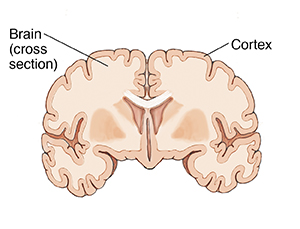Corticobasal degeneration (CBD) is a rare brain disease. It’s also known as cortical basal ganglionic degeneration. CBD causes some parts of the brain to shrink and lose nerve cells. This happens over time in the outer layer of the brain (cortex). It affects the area in the front section of the brain the most. This leads to loss of muscle function, trouble with memory and speech, and behavior changes.
How to say it
kor-tih-koh-BAY-zuhl
dee-jen-er-AY-shun
What causes corticobasal degeneration?
Researchers don’t know the exact cause. It may include genes, aging, and environmental factors. They have found that a protein called tau is part of the process. Tau is a type of protein found in brain cells. With CBD, too much tau protein builds up in certain brain cells. This causes those brain cells to shrink and lose function. The loss of brain cells can start between ages 45 and 70, most often occurring around age 60. These kinds of changes in the brain due to tau protein are also found in other disorders. They include forms of dementia, such as Alzheimer disease and Pick disease.
Symptoms of corticobasal degeneration
The symptoms may start on one side of the body. Symptoms vary for each person. They can include:
-
Trouble with balance and walking.
-
Stiffness.
-
Slow or clumsy movement.
-
Short-term memory problems.
-
Trouble controlling muscles of the face.
-
Trouble with speech.
-
Trouble swallowing.
-
Slight tremor.
-
A joint stuck in a bent or straight position (contracture).
Symptoms can show up in various ways, including:
-
Trouble thinking of the right word or a person's name.
-
Trouble reading and writing.
-
Trouble with simple math.
-
Trouble opening a door, brushing teeth, buttoning a shirt, or combing hair.
-
Tripping and falling often.
-
Movement of an arm or leg that you can’t control.
-
Repetitive behavior.
-
Impulsive behavior.
-
Loss of interest.
-
A lack of attention.
-
An irritable mood.
Diagnosing corticobasal degeneration
It’s hard to diagnose CBD. This is because the symptoms are like those caused by many other diseases. You may have tests to look for problems, such as stroke or a tumor, that can cause symptoms like CBD. You may have a CT scan or MRI. These can look for blood clots or loss of brain tissue. If your symptoms match common symptoms of CBD and your test results rule out other problems, you may be diagnosed with CBD.
Treatment for corticobasal degeneration
There is no treatment to slow down the loss of brain cells. But types of treatment may help with some symptoms. These include:
-
Occupational therapy. This can help you keep up with daily activities, such as bathing, grooming, eating, and other self-care.
-
Physical therapy. This can help improve mobility and range of motion. It may help prevent pain and help muscle tone.
-
Speech therapy. This can help you speak more clearly.
-
Medicines. Some medicines may help treat stiff muscles, pain, behavioral symptoms, and movement.
-
Adaptive medical tools. Tools, such as a walker, can help with balance and movement. Reachers, grabbers, and other tools can help with daily actions.
There is ongoing research about this disease. Talk with your health care team if you want to be part of a clinical trial for a new treatment.
Possible complications of corticobasal degeneration
The disease gets worse over time. A person may not be able to walk within a few years. Within 5 years, they may not move at all, and may be bedridden. They may not be able to communicate. Within 10 years, they are at risk of death from problems caused from lack of movement, such as pneumonia or blood clot in the lungs.
Living with corticobasal degeneration
CBD is a stressful condition to manage, and for families to cope with. Talk with your care team about ways to get help. They can refer you to counseling.
When to call your doctor
Call your health care provider if you have:
-
Symptoms that don’t get better or that get worse.
-
New symptoms.


